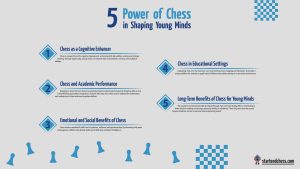5 Power of Chess in Shaping Young Minds: A Cognitive Perspective
Chess has long been celebrated for its intellectual rigor and strategic depth, but its impact extends far beyond the confines of the chessboard. The role of chess in shaping young minds is increasingly recognized for its profound cognitive and emotional benefits. As a game that demands foresight, critical thinking, and strategic planning, chess fosters essential skills that contribute to a child’s overall development. By engaging with this classic game, young players enhance their memory, problem-solving abilities, and emotional resilience, making chess a valuable tool in nurturing well-rounded individuals.
In today’s educational landscape, the integration of chess into curricula and extracurricular activities is gaining momentum. The cognitive advantages of chess in shaping young minds are evident in improved academic performance, particularly in mathematics and language arts. Additionally, the game’s emphasis on patience, discipline, and strategic thinking helps children navigate both academic and personal challenges with greater confidence. As we explore the impact of chess on cognitive development and emotional growth, it becomes clear that chess is not just a game but a powerful catalyst for shaping the future generation’s success and resilience.

-
Chess as a Cognitive Enhancer
- Boosting Memory and Concentration
Chess is a game requiring memory and forecasting. One has to remember lots of position pieces, different moves, and strategies involved through the game. This constant engagement works on both short- and long-term memory. Studies proved that frequent practice with chess develops memory retention power along with sharpened concentration, whereby keeping young players to focus easily on their schoolwork and other activities.
- Enhancing Problem-Solving Skills
Chess, above all, is a problem-solving game. In every move, there is a new solution to be made, and for that, a player needs to think many steps ahead of time by considering multiple scenarios. This process develops critical thinking. Young players acquire the ability to analyze situations, estimate their pros and cons, and finally come up with some sensible solution. This ability of critical thinking is an important skill that applies beyond the board into daily life and at school.

-
Chess and Academic Performance
- Mathematics and Logical Reasoning
The game of chess closely aligns with mathematical concepts because of its logical structure. A player has to recognize the pattern, calculate probabilities, and understand spatial relationships—all basics of mathematics. This is vindicated by various studies that students who play chess regularly tend to perform better in mathematics since the game enhances their reasoning power.
- Language and Reading Comprehension
It is also curious that chess has a good influence on language. The game develops abstract thinking, a talent that is taken as one of the key prerequisites for the development of language and reading skills. During the formulation of strategy, the young players become engaged in some kind of mental conversation; they build plots in their mind relating to the moves and their results. This kind of thought transfer can be projected on reading and writing of the student since they start to comprehend more difficult text and create a more colorful reflection of their ideas.
-
Emotional and Social Benefits of Chess
- Developing Patience and Discipline
Chess teaches patience because every move must be thought through. The young player learns delayed gratification, realizing that in chess, much as in life, one of the keys to success is planning carefully and then waiting for the right moment. This can transfer to a valuable life skill of discipline and self-control, helping kids and adolescents to keep their impulses at bay.
- Building Emotional Resilience
Defeat is a part of chess. Even world champions lose games, which at times may be after hours of tussle on the board. Learning how to deal with defeat and moving on with renewed determination builds emotional strength. The young players who engage frequently in chess are better equipped to cope with setbacks in other areas of life, knowing that failure is not the end; it’s an opportunity to learn.
- Promoting Social Interaction
Chess, therefore, is played mostly in couples or even as a team; thus, it is associated with social interaction and collaboration. It encourages communication, respect for others, and sportsmanship wherever it’s played: casual or competitive. These are important social skills in a world that is increasingly an admirer of teamwork and cooperation.

-
Chess in Educational Settings
- Integrating Chess into the Curriculum
Knowing the cognitive and social benefits of chess, many schools have adopted it into the curriculum. Chess clubs, after-school programs, and even formal classes provide students with a chance to develop their chess skills in a structured environment. Educators have found that chess enhances not only academic performance but also helps to develop a love for learning, as students are challenged and rewarded by the game.
- Chess and Special Education
Chess has been especially useful for special education. The structured environment of chess is very helpful to children with learning disabilities or attention deficit disorders, where they are able to focus and start achieving success. For such students, the rules of chess and clarity about the objectives of the game give them a feeling of order and predictability, which builds confidence as their cognitive skills develop at their own rate.
-
Long-Term Benefits of Chess for Young Minds
- Preparing for Future Challenges
Chess will help in developing the cognitive skills of critical thinking, problem-solving, and logical reasoning, which can be applied not only in academics but also at work and in one’s personal life. A young mind that has received training to play chess is better placed in dealing with modern complex issues. These range from making sound decisions regarding career options to a host of well-informed decisions taken by an individual in his daily life.
- Lifelong Love for Learning
Chess is inculcation of the love of lifelong learning. The game is intellectually stimulating and of infinite complexity, keeping a player interested for years on end. Such a love for learning, kindled by chess, spills over very often into other areas of life, compelling young people to want to know more about everything, seek challenges, and develop their minds.

Conclusion:
Chess is much more than a game; it’s a strong tool that shapes young minds in ways extending beyond the board. Chess helps children and teenagers develop critical thinking, gain emotional resilience, and engages them in long-term interest in learning. These cognitive and emotional gains will have them well-placed to confidently and clearly overcome the intricacies of academic and personal life. They formulate a base for success in a constantly changing world by gaining the ability to think several moves ahead, handle one’s emotions, and approach challenges by wits alone.
Imagine a generation of youth who, through chess, are equipped to meet life’s challenges with patience, discipline, and creativity. Chess doesn’t only prepare kids for a game; it prepares them for life. In the classroom, on the playground, and in their future careers, these skills learned from chess will serve them very well. The more parents, educators, and communities that come to recognize the power of chess, the more we can look forward to a future where young minds are not only sharper but more resilient, innovative, and ready for whatever comes their way.
We’ve prepared a podcast to accompany this article, offering the same insights in an audio format. If you enjoy listening, give it a play:
References:
- Burgoyne, A. P., Sala, G., Gobet, F., Macnamara, B. N., Campitelli, G., & Hambrick, D. Z. (2016). The relationship between cognitive ability and chess skill: A comprehensive meta-analysis. Intelligence, 59, 72-83.
- Sala, G., Gobet, F., Trinchero, R., Ventura, S., & Ventura, P. (2017). Does chess instruction improve mathematical problem-solving and reading comprehension? A meta-analysis. Educational Research Review, 18, 46-57.
- Kazemi, F., Yektayar, M., & Abad, A. M. (2012). Investigation of the impact of chess play on developing meta-cognitive ability and math problem-solving power of students at different levels of education. Procedia – Social and Behavioral Sciences, 32, 372-379.
- Aciego, R., García, L., & Betancort, M. (2012). The benefits of chess for the intellectual and social-emotional enrichment in schoolchildren. The Spanish Journal of Psychology, 15(2), 551-559.
- Smerdon, D., & De Bruin, A. B. H. (2021). Chess as a tool to train self-regulation and other executive functions in children: Recent evidence and controversies. Current Directions in Psychological Science, 30(4), 306-311.
- Ferguson, R. (1995). Chess in education research summary. Paper presented at the Borough of Manhattan Community College, New York City.
- Sala, G., & Gobet, F. (2016). Do the benefits of chess instruction transfer to academic and cognitive skills? A meta-analysis. Educational Psychology, 36(4), 771-791.
- Bart, W. M. (2014). On the effect of chess training on scholastic achievement. Frontiers in Psychology, 5, 762.
Recommended Articles:



0 Comments